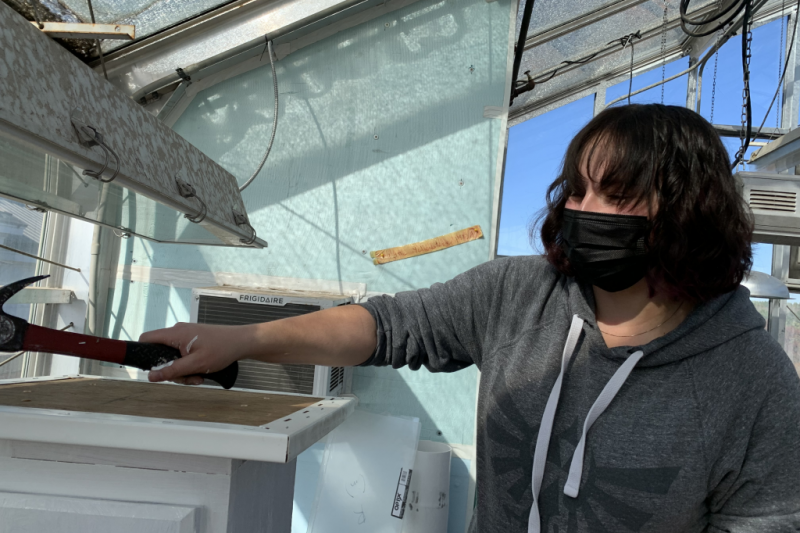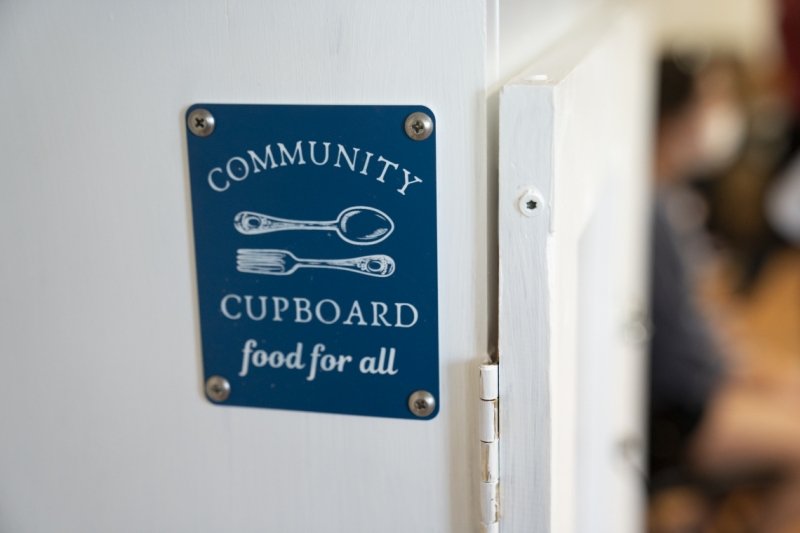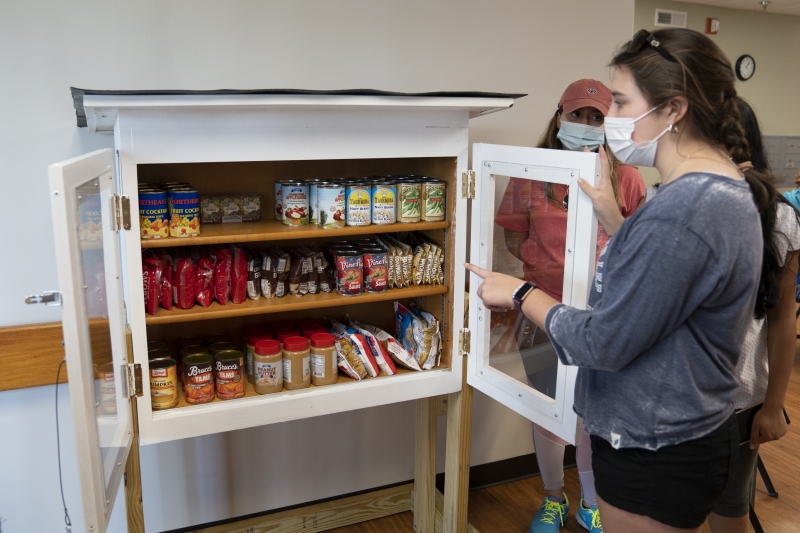Community Cupboards Collaboration Addresses Food Insecurity The recent Community Cupboards collaboration with the Virginia Cooperative Extension offered students the opportunity to tackle food insecurity from a cross-disciplinary perspective.
Community Cupboards, miniature food pantries pilot program that offers Rockbridge County residents a rotating menu of nonperishable groceries, is the latest collaboration between Washington and Lee and the Virginia Cooperative Extension to bring a new resource to the local community.
The miniature food pantry project began in a brainstorming session between Sarah Blythe, Associate Professor of Biology, and Rebecca Wilder, Virginia Cooperative Extension family and consumer sciences SNAP-Ed agent. Students in Blythe’s course, Food for Thought: Topics in Nutrition and Metabolism, identified five locations in the county to place miniature food pantries. The pantries, which were erected in early November, contain food, recipes and nutrition information. Students in Howard Pickett’s course, Fieldwork in Poverty and Human Capability, stocked the pantries and collected usage data throughout Winter Term.
The project was inspired by a grassroots movement called Little Free Pantry, as well as Blythe’s commitment to expanding her coursework beyond nutrition to include societal and socioeconomic factors that might influence one’s relationship with food. In fall 2020, she had teamed up with Rebecca Wilder, family and consumer sciences SNAP-Ed agent at Rockbridge County’s office of the Virginia Cooperative Extension, to offer local elementary school students take-home cooking kits and science experiments designed to facilitate nutrition education during a year where in-person engagement with area schools was not possible. As Blythe began to plan her course syllabus for Fall Term 2021, she was excited about working together again with Wilder. They realized that there were opportunities to bring healthy food options to the Rockbridge community in a new way that could supplement the work of local organizations dedicated to addressing food issues. Blythe and Wilder co-developed the little pantries program and together planned ways to incorporate it into Blythe’s course.
Blythe reached out to Michael Hepner, laboratory technician for the Biology Department, for assistance with the construction of the boxes. Hepner’s expertise, Blythe said, was instrumental in creating the five boxes that comprised the pilot phase of the project. In addition to constructing the boxes, students spent time surveying areas within Rockbridge County to determine where to strategically place the boxes, sometimes sitting and observing a site over the course of several days to track traffic patterns. Students worked in small groups to create proposals for placement of the pantries as well as ideas for fundraising and recipe cards that could accompany stocked items. Blythe said she was impressed by her students’ creative ideas for promoting the cupboards, including naming the project “Community Cupboards” and creating a social media plan. The boxes were placed shortly before Thanksgiving.
Blythe said that incorporating a community-based learning project into her course allowed students to see that where one lives can impact access to food and affect health outcomes. “A lot of students really do cite that as a lightbulb moment,” Blythe said.
Alessandra Del Conte Dickovick, W&L’s associate director of Community-Based Learning, has worked with the Virginia Cooperative Extension on multiple projects and across many disciplines that ultimately helped form the Community Cupboards project. She said the goal for each community partnership is to create a mutually beneficial collaboration between the community and the courses taught at the university. The Office of Community-Based Learning connects students’ academic work with community needs in a variety of ways.
“With CBL, there are different degrees in which you can incorporate a community-engaged aspect into the course,” Dickovick said. “The whole course can be a collaboration or it could be that you develop one class assignment that focuses on a community-engaged collaboration. It’s not a one-size-fits-all.”
Howard Pickett, director of the Shepherd Program and associate professor of Poverty and Human Capability Studies, knew he wanted to include a CBL project in his Winter Term class, POV 102, which includes coursework on food justice and food insecurity. After reaching out to the Office of Community-Based Learning to discuss available projects, he quickly identified an opportunity to continue the Community Cupboards project in alignment with the Cooperative Extension’s goals.
“It’s important to us in the Shepherd Program to model a particular type of effective, respectful collaboration with community partners,” Pickett said, “and to try to build on what community partners are already doing.”
Pickett’s course encouraged students to examine how the project weaves together the complex considerations involved in addressing food insecurity. Class discussions explored the value of localized community efforts such as Community Cupboards in the context of larger structural support systems that address food insecurity.
Ryan Brink ’18, who serves as the coordinator for Campus Kitchen, visited Pickett’s class early in the term to provide students with context for the Rockbridge community’s current food relief efforts.
“I wanted them to consider what’s currently happening and why,” Brink said, “and to think about barriers to access as well as potential roles they can fill.”
Wilder and Brink consulted with students on their final reflections, and on a handbook the class created to aid volunteers and community partners in picking up the next phase of the project. Wilder is in conversations with Campus Kitchen, the Shepherd Program and other community organizations to create a long-term plan for stocking the boxes. Wilder likened her experience working with Pickett’s class to having a team of consultants.
“Students going through the Shepherd Program are trained to think in a different way,” Wilder said. “For example, one of the students suggested we put a bag holder on the pantries so that people have a bag to put their groceries in, since some might be walking. They really provided some great ideas for how to make this the most comfortable experience for people who are participating.”
Dickovick said this project is a great example of what the Office of Community-Based Learning hopes to achieve when facilitating collaborations between faculty and community partners.
“We’re always asking ourselves, ‘How can we build and scaffold projects that students do in one class and take them to the next level,” said Dickovick. “This is what happened with this project. I think this shows the depth and breadth of what CBL can do.”
 Cassandra Sobieski ’22 helps with construction of a community cupboard as part of a community-based learning project.
Cassandra Sobieski ’22 helps with construction of a community cupboard as part of a community-based learning project. Students created a logo and signage for the pantries.
Students created a logo and signage for the pantries. POV 102 students stock cupboards during Winter Term.
POV 102 students stock cupboards during Winter Term.
You must be logged in to post a comment.